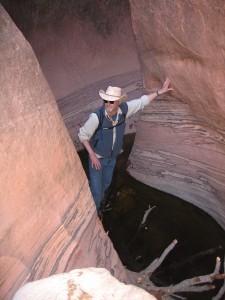Jim McMahon launched Sweetwater LLC
in September 2002 after an extensive search for a business that he could operate from his home in southern Utah, where he lived at the time. Sweetwater provides home water purification systems to health conscious consumers.
Jim studied ecology and animal behavior at the University of Illinois. He has worked in the environmental field since 1974 when he launched one of the first recycling collection programs in the country. He worked in recycling in Seattle for many years, launching several successful business ventures and crafting Seattle’s first recycling strategy. One element of this was the first intentional variable collection rate structure in the country. In 1987 he took a one year sabbatical in the French West Indies. Upon his return to the states, he moved to Denver where he began working as a freelance writer and sought a way to work with rivers, since he had long been attracted to flowing water. In 1995 he got a chance to launch The Nature Conservancy’s Mackinaw River Project in Illinois. Then, in January 1999, he was able to return to the West when he accepted a position with Grand Canyon Trust, working on the Virgin River in southwest Utah. While working for GCT Jim led an effort to identify the cause of cottonwood decline in Zion National Park.
Jim has authored an essay reflecting on the development of recycling entitled ‘Closing The Loop’ in the book The Next West, published by Island Press in 1997. While living in Denver he wrote policy papers and opinion editorials on western land use issues as a senior fellow for Independence Institute, a non-profit think tank. He has also published numerous articles, editorials, and short fiction. Jim holds a BS in Ecology from the University of Illinois, coursework toward an MA in Deep Ecology from Naropa Institute in Boulder, CO and has extensive training in river ecology. He studied the ancient energy healing methods of the Quechua Indians of Peru with the Four Winds Society located in Park City. In addition, Jim has been researching his Irish roots and obtained Irish citizenship. Jim has an active yoga practice, eats organic food, but loves a good margarita. Someone once said that Jim has a passion for learning and is always up to something.
He has a son, Emrys, and a daughter, Jacqueline. He works from home outside of lovely Durango, Colorado. ‘Life doesn’t get any better than this…’
Learn more about the home water purification systems sold by Jim
Or find your water quality report and call him at 866-691-4214 ( M – F: 9 AM – 5 PM Mountain time only)
Contact Jim at: jim @ cleanairpurewater dot com








Hi Jim
After reading your ultimate guide on water systems, we bought the pelican system.
The water checked out to be very clear of contaminents. However, now the water tastes bad. It may be the minerals that I am not used to therefore I do not want to make any changes until checking in with you. Your thoughts?
Thx, Kaye in Arizona
Kaye –
I’m surprised that my Ultimate Guide led you to purchase a Pelican whole house water filter. I don’t think much of that system and prefer a backwashing filter. The latter are significantly more effective and last longer. Send me an email and ask for my explanation of why a backwash whole house filter is better than an upflow filter.
Next, I don’t know what you mean that the water checked out to be clear of contaminants. I’d have to see what test was performed to comment on that. If your water tastes bad then I would bet you have a high total dissolved solids (tds) and contaminants in your water that are not removed by the pelican. Probably the only test that was performed was for chlorine removal, which a new carbon filter, regardless of design, would do.
Often times a person needs both a whole house water filter and a kitchen water filter in order to make water taste good and healthy to drink. The reason is that whole house water filters remove one set of contaminants while kitchen water filters remove those same contaminants and many more.
Again, I don’t know where you live, nor have I see your local water report. What my Ultimate Guide to Selecting the Perfect Water Treatment System suggests is that you go through my five step process and part of that is reviewing your local water report.
I encourage people who want the healthiest water possible to obtain a copy of their local water report and then call me.
I recently moved into a house that has a Springhouse whole house water filter. Everything appears to be in working order including the UV light. I would like to replace the six water filters. Do you have an idea what are the best filters to put in there? Do you know what size they happen to be? The exterior measurements appear to be around 4.5 x 20″.
I appreciate any insight you can give to this matter. Thank you.
Since you’re on a well, the only way to determine what you need is with a water test.
I do provide Springhouse filters.
Jim
We have to replace our polybutylene pipes with pex as they tell us that our well water is too hard for copper pipes. I have a young son and am very concerned about the off gassing especially when the pipes are new. I feel like I need point of use filters for the kitchen, bathrooms (showers and sinks) and even the washing machine. Feeling discouraged and don’t know where to start to protect our family… I’ve chosen pex class b over class a, but what else can I do? Will running the water constantly at first, along with the POU filters help? For how long do I need to do so?
My understanding is that the pex will leach for a year or longer. You can keep your copper pipes and use a water softener.